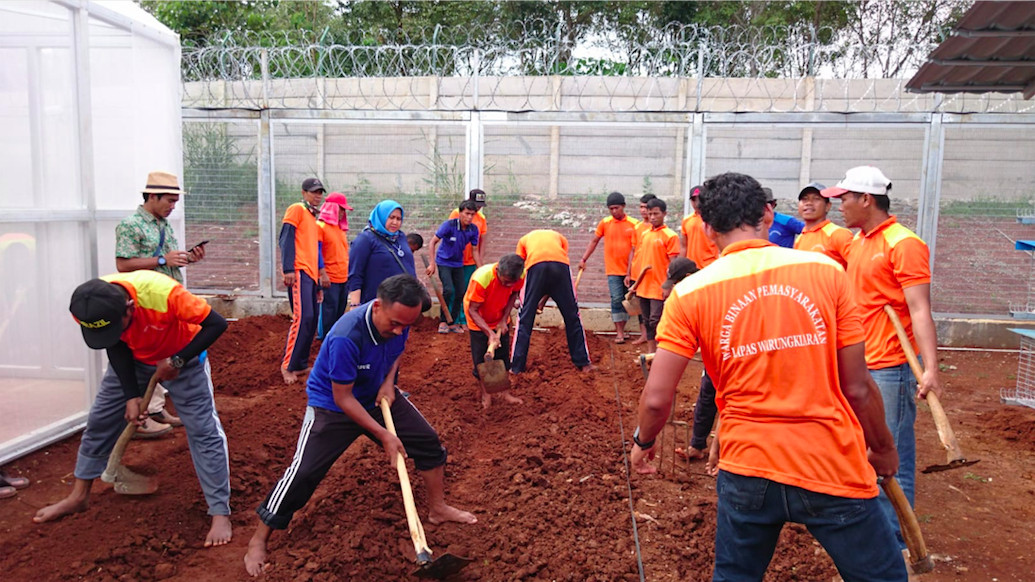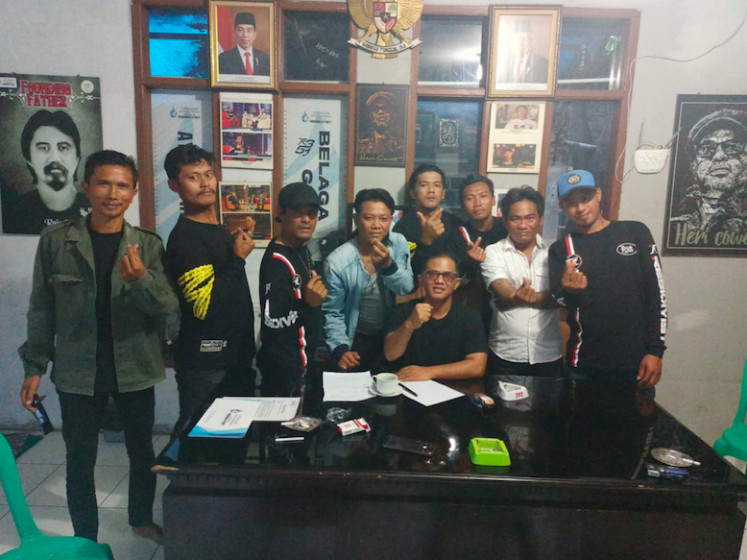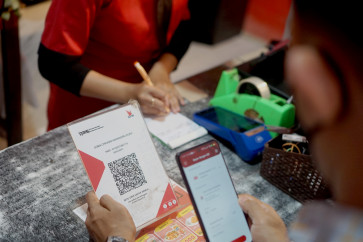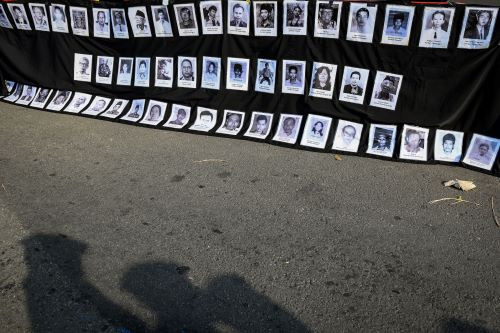Popular Reads
Top Results
Can't find what you're looking for?
View all search resultsPopular Reads
Top Results
Can't find what you're looking for?
View all search resultsEx-convicts share stories of challenging job searches and unending stigma
Change text size
Gift Premium Articles
to Anyone
S
tigmatized and blacklisted, former convicts can barely survive, carrying the extra burden of finding work during the pandemic and reintegrating into society.
"I applied in every job field available, from openings as an office boy to a courier. But not one company would call me back for an interview. They'll ask for your police statement [SKCK]," shared Acil, not his real name, an ex-convict from Jakarta.
In 2020, Acil was released from prison after being sentenced to three years and six months for drug-related violations. He is ready to rebuild his life, but he sees the career world as viewing him with disdain.
The 32-year-old is currently working as a courier for a local nongovernment organization called Anugerah Insan Residivist, which was founded in 2000 by Asep Djuheri, also an ex-convict. The NGO focuses on mentoring ex-convicts by conducting classes like sewing, calligraphy and social skills to help each individual get ready to reintegrate themselves into society.
"The companies told me that they had just faced a great layoff due to the pandemic, but I know [it’s] because I am labeled as an ex-convict," Acil continued.
Rejection
The pandemic has worsened the situation. The Manpower Ministry reported in December 2021 that at least 72,983 workers were laid off due to the pandemic. Those who were laid off did not have emergency funds to support themselves and their families. The SMERU Institute reported that at least 27.54 million Indonesians had fallen into the lowest socioeconomic class. Individuals with an SKCK became more prone to job rejections.
Anton, 44, a father of two, and Aris, 48, a father of three (both not their real names) previously joined a local radical group called Al Hijrah Al Khoir. They were released from prison in late 2020 after declaring their loyalty to Indonesia (NKRI) and serving sentences of 3.5 years.
"We are already blacklisted. [Employers] don't want us to be part of their company – due to our age, but also because we were part of the radicalized group," Aris shared. Both Aris and Anton have tried to apply for work as couriers, but neither has received a call back.
"Which makes our reintegration process into society more challenging because we have faced enough rejection," Aris continued.
Aris and Anton are currently working as parking attendants where they make Rp 100,000 (US$6.73) to Rp 150,000 each day. They take turns with their peers every five hours around East Jakarta.
To help their families, Aris's wife sells fruit cocktail desserts, while Anton's wife sells stationery in their local neighborhoods. Both shared that the money they earned was not enough.
In June the consumer price index (CPI) increased by 4.35 percent year-on-year (yoy) while the following month saw Indonesia's inflation reach the highest level since June 2017 – this has worsened the economic situation for the ex-convicts as they can barely afford to buy daily needs.
Help others: Asep (center, sitting down) shared that his goal is to establish his non-profit organization, Anugerah Insan Residivist, in all of the cities in Indonesia to help ex-convicts reintegrate themselves into society. (Courtesy of Asep Djuheri) (Courtesy of Asep Djuheri/Courtesy of Asep Djuheri)Second chance
Acil was eventually able to secure a job in Bandung. Each month, he earns Rp 1 million to 2 million, but this is still not enough to cover his child's school tuition and groceries. Before prison, Acil worked as a cashier at a local grocery store. He is also equipped with video editing and graphic design skills.
"I don't think the law in Indonesia sides with ex-convicts who want to rebuild their lives. Society also doesn't have enough trust [in ex-convicts]," Acil opined.
Aris and Anton shared a similar concern: they are worried about supporting their children's education.
"Informal education and formal education are equally important so we don't misunderstand things or get manipulated by others easily. [I] won't let my children go through the same thing as me," Anton said.
40-year-old Bayu (also not his real name) was released from prison last year after being sent behind bars for a fraud-related case, where he claims to have acted to cover his boss. Before prison, Bayu worked as a sales assistant at an automotive dealership in Jakarta. But despite being released for almost a year, he struggles to find a stable job.
"I'm currently racing against time to support my family," Bayu said.
Bayu added that due to the lack of second chances given to ex-convicts, many go back to a life of crime.
Both Bayu and Acil said that recruiters would not call them back after knowing their troubled past. It is a common practice for employers to ask employee candidates about their criminal history.
"I've got an educational background and certificates for the available position, but the stigma lays all that to waste," Bayu shared.
‘Alternative punishment’
Criminologist Prija Djatmika from Brawijaya University added that overcriminalization had made people who had committed petty crimes face more hurdles in employment, as in most societies stigmatization had become a norm.
"Technically, it is done when people have already served their time in prison. They've paid the price," Prija said. He added that sending someone to prison for petty crimes like stealing milk, the most straightforward crimes, would not resolve the situation.
"Some criminals eventually regret their decisions, but for others, going to prison means that they instead learn how to do [more serious] crimes," Prija said.
The Institute for Criminal Justice Reform (ICJR) reported that data from 2017 to March 31, 2020, showed that 10.18 percent of ex-convicts reoffended.
Prija suggested that the court should redefine crimes in its decision-making and develop alternative punishment for criminals, like community services.
"The police statement given to ex-convicts is a huge blow to their life's record. We don't have rules that send people with petty crimes to community service," Prija continued.
Prija cited a campaign called Ban the Box that pushes companies to refrain from asking their employee candidates about their criminal records in the United States. He added that such a method was an example of helping ex-convicts reintegrate themselves into work.
Dete Aliah, an executive director at the Society against Radicalism & Violent Extremism Indonesia (SeRVE) Indonesia, added that social acceptance would help ex-convicts change their perspectives. Dete further added that for ex-terrorists, work placements would help divert their prejudice.
A 2020 report by the Institute for Policy Analysis of Conflict (IPAC) titled Terrorism, Recidivism and Planned Releases in Indonesia found that of the 825 men and women convicted of terrorism and released back into the country from 2002 to 2020, 94 had repeated their offense.
Freed without freedom: Ex-convicts found it more challenging to find a job due to the stigma that has been built among the society. (Pexel/RODNAE Production) (Pexel/RODNAE Production)Reintegration challenges
Bayu shared that the other challenge was reintegrating with the community. Especially for convicts who were not used to the technology.
During the pandemic, technology has become more vital in all aspects of employment, from Zoom meetings to online interviews. However, Bayu shared that these skills were not given while he was in prison, and it would be more challenging for older ex-convicts to adapt.
"To learn those skills we also need money to enroll in classes, but we also need money to live," Bayu said.
Those who are fortunate can find a positive community to enhance their skills and help them reestablish their life after prison. Acil and Bayu, for instance, now work for Anugerah Insan Residivist, which has locations in different cities. They contribute as content creators and enroll in classes such as video and photo editing while also participating in their local communities.
Finding a community willing to help ex-convicts reintegrate into the public can be challenging. Yet others who cannot find a positive community often have no access to connect with people, no friends to rely on and the possibility to return to their old ways.
Asep described how as a young man he had been in and out of prison eight times in ten years. He first got convicted of stealing a motorcycle. Then he was convicted of drug abuse. Finding it hard to help himself reintegrate and sharing that some rehabilitation programs inside the prison were not the same for all inmates, Asep decided to establish his own NGO and work with fellow ex-convicts.
"The prison capacity was full, hence not all prisoners received the same rehabilitation process. At least 25 percent of them knew nothing about reintegrating themselves into the community," said Asep, who established the organization in 15 cities across Indonesia such as Bogor in West Java, Padang in West Sumatra and Lampung.
Asep also highlighted that if a workplace did accept ex-convicts, it was easy for them to look down on the employees. Asep said situations like this affected their mental health.
"There has been a case where my friend was accepted to work at a restaurant, but after knowing her background, the place decided to cut her off," Asep shared.
Sri Wahyuni, founder of NGO Yayasan Perempuan Inovasi Mandiri, shared that prison wardens could work closely with local organizations to help ex-convicts reintegrate. She added that the wardens could also aid rehabilitation with more programs focusing on health and education like entrepreneurship that enable inmates to reintegrate themselves.
Sri took the example of Norway's incarceration system, which solely focuses on restorative justice, citing research by Manudeep Bhuller, Gordon B. Dahl and Katrine V. Løken in 2019. Through Norway's rehabilitation system, which helps ex-convicts to find work placements, there has been at least a 34 percent increase in ex-convicts participating in job training courses and a 40 percent increase in employment rates.
"Programs like selling art made by the prisoners, as an example, can help their reintegration because the money can serve as an initial amount to set up a business," Sri said.
Sri also said that rehabilitation classes post-imprisonment were also significant.
"Their post imprisonment is key to how they finally can integrate themselves with the society. Therefore, the government should be more focused on that," Sri added.
"There are things that these ex-prisoners are hoping for from the communities. The first is acceptance, then getting a job. There are no other things they want aside from being treated like others," Asep closed.












